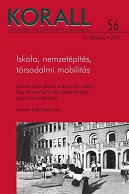A szlovák anyanyelvi oktatás problémái a hosszú 19. század második felében
Schools and Nation Building. Problems of Slovakian-Language Education in the Second Half of the Nineteenth Century
Author(s): Barna ÁbrahámSubject(s): History
Published by: KORALL Társadalomtörténeti Egyesület
Summary/Abstract: The study reviews the main issues surrounding Slovakian-language education in the second half of the long nineteenth century. The brief history of the institutional framework explains the initial boom of primary education (parish and village schools), followed by a dramatic decrease in their numbers in the Age of Dualism and a decade-long strife for Slovakian secondary education. The story continues with the birth of the first secondary schools in the 1850s and 1860s (benefitting from the policies of Absolutism), their eventual governmentled discontinuation in 1874–75, and the subsequent efforts to either reinstate them or substitute them with Czech and Moravian schools and trade schools. The study examines the role of the church, government and ethnic politics in the overall negative balance of these processes, and at the same time provides insight into the internal limitations of the Slovak stakeholders: mass apathy and opportunism, preference for Hungarian-language schools, teachers with no dedication (providing poor teaching, money-oriented attitudes, alcoholism), and active dedicated teachers with problems of attitude, such as intolerance, doctrinaire outlook, complete disregard of local circumstances, or looking down on the peasantry. Further nuancing the picture, the study goes on to describe the ambiguous role of the Czech elite, especially the treatment of Slovakian as an independent literary language with disdain and enforcing Czechoslovakism, which was to severely impede the building of Slovakian-language education system after 1918. In conclusion, the study points out the fundamental paradox that while the elite considered Slovakian-language schools, and primary and secondary school teachers, as principal means of nation building, the solidification of the institutions and teachers’ situation was thought to be the duty of the same (assumed) society and nation.
Journal: Korall - Társadalomtörténeti folyóirat
- Issue Year: 2014
- Issue No: 56
- Page Range: 69-95
- Page Count: 27
- Language: Hungarian

